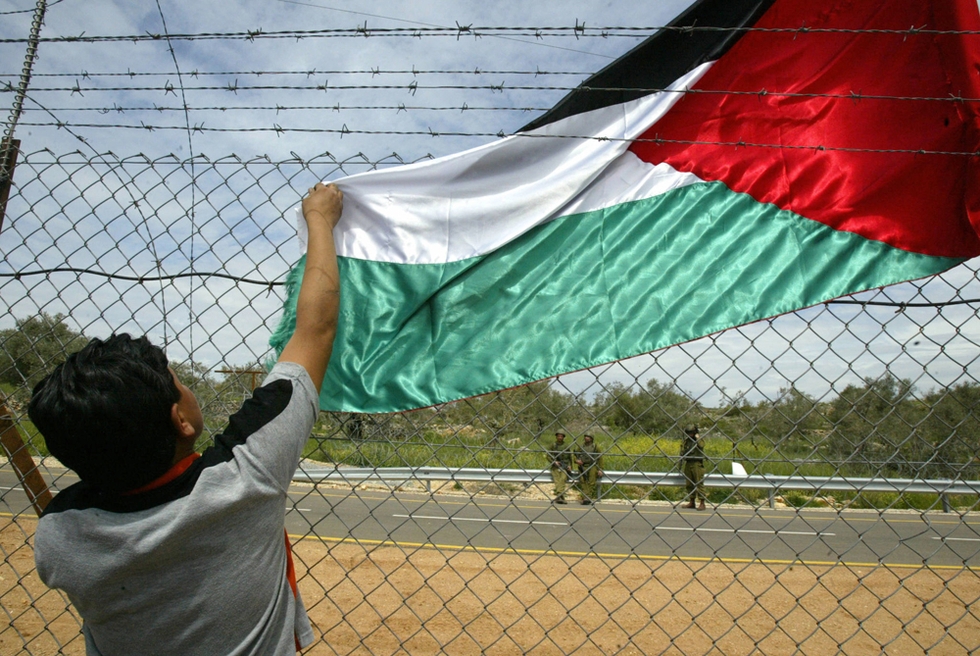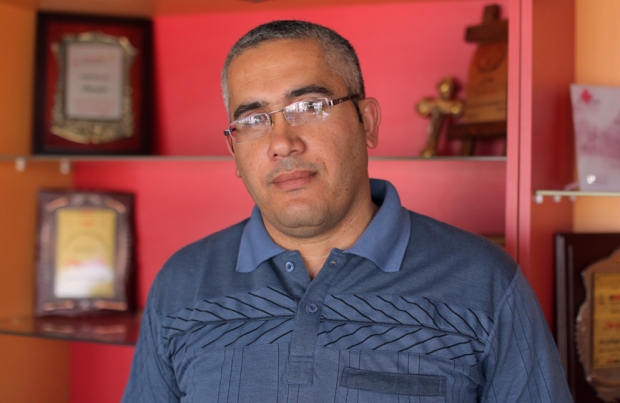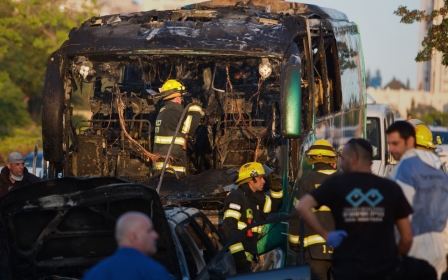Shot looking for work: Palestinians face Israeli bullets at illegal crossings

DAR SALAH, Occupied West Bank - Khalid Rashaida was crossing into Israel on an illegal path from his village when he was shot in the leg, one of nine people reportedly hit by Israeli gunfire at the same crossing this month.
“I didn’t see any soldiers around when I went to cross through the opening in the chain-link fence," Rashaida told Middle East Eye. "But once I was on the other side I felt something hit my leg and looked down and I was bleeding."
The 42-year-old passed out and woke up in a nearby hospital before having to undergo surgery to remove the bullet.
“There was no warning before they shot,” Rashaida said. “They didn’t need to shoot me because I would not have run. I am an old man. I swear if they would have yelled at me to stop I would have stopped right away.”
The Israeli army told the Palestinian news agency Maan that it had no report of the incident.
The unemployment rate in the occupied West Bank is about 18 percent, a three-percent rise from 2015, according to the Palestinian Bureau of Statistics.
The bureau says the average daily wage in the West Bank is about $26, half of what a Palestinian working in Israel takes home each day.
According to Israeli workers rights’ group Kav Laoved, about 30,000 Palestinians in the West Bank are granted Israeli work permits each year, but that is a fraction of those who apply, resulting in thousands of others working illegally.
The group found that illegal workers not only take huge risks in crossing, but are also “more vulnerable to exploitation by their employers”.
Still, there is little to no work to be found at home.
Othman Salah, a member of Dar Salah village’s local council, told MEE that Rashaida was the ninth person to be shot and wounded this month while trying to cross. About 200 Palestinians use the crossing each day to head into Israel.
“The crossing is very dangerous, everyone knows that, but usually it’s not like this,” Salah said. “The past few weeks have been very intense for workers making the crossing.
"I think the recent bus bombing in Jerusalem, and then all the Jewish holidays being celebrated lately, have made the situation more complicated. The Israeli soldiers seem to be trying to send a message that the crossing is too dangerous to risk.”
Rashaida said he did not know when he will recover from the wound he suffered on Sunday, but he will continue taking the illegal crossing at Dar Salah village, in spite of the danger.
“It’s not like any of us want to work illegally in Israel,” Rashaida said. “But there are no jobs in the West Bank, so I have no choice but to do this, and this time I was unlucky.”
“The wages are not comparable - to work in Israel is much better money.
"And Israel won’t give me permission to work legally, so my choice to feed my family is to work illegally. I’m not asking for handouts, I want to work for my money, but I will do whatever I have to do to feed my wife and seven kids. For me that means working illegally in Israel, I don’t see one single other option.”
Ahmad, 26, was himself preparing to cross on Sunday when he heard about Rashaida.
“I put my bag down and decided not to go - I didn’t want to risk it,” Ahmad said, asking to only be referred to by his first name for fear of retaliation by the Israeli government.
Ahmad has been making the illegal crossing from Dar Salah village since he was 18, he said. Just months after he began making the crossing, he saw a man shot dead by Israeli forces.
“I knew the risks from the beginning. Of course it is dangerous, but there are no other options for work."
Ahmad has a degree in accounting from Bethlehem University, but upon graduation found there were no jobs in the West Bank. Instead he labors illegally in Israel as a construction worker.
“It is hard to find a job here anyway, but if you don’t have a family connection, or if you aren’t with the [ruling] Fatah party, forget it - it’s impossible to find a job in the West Bank, even with my degree."
The Palestinian Bureau of Statistics found that youths aged 20-24 suffer the highest rates of unemployment, with nearly half having no jobs, although it was unclear if that statistic included the Gaza Strip as well as the occupied West Bank.
“I was caught once by Israeli forces when I was already in Israel and I was so scared they would take me to prison, but in the end they just dropped me off at a checkpoint in the northern West Bank and left me there,” Ahmad said. “I know it is not always that simple, but nothing here is simple.
“People ask me if I am scared to cross illegally into Israel because it’s dangerous, but everything here is dangerous. I can be shot and killed for nothing, for crossing the road, for being in the wrong place.
"In the end, I need to make a living and working in Israel is the only way for me. If I do the same full-time construction job in the West Bank I won’t even make enough to pay for my transportation and food.”
To mitigate the risk of the crossing, Ahmad enters Israel for months at a time, working and finishing a project before returning home to the West Bank.
He eats and sleeps at his building site, only leaving the site when absolutely necessary.
“It’s not a nice life, crossing borders and sleeping in construction zones, but there is not life here. We say, ‘We live because we are not dead,’ because that is all it is. Living life with no options isn’t life, it’s just not death.”
Israeli authorities did not respond to requests for comment.
Middle East Eye propose une couverture et une analyse indépendantes et incomparables du Moyen-Orient, de l’Afrique du Nord et d’autres régions du monde. Pour en savoir plus sur la reprise de ce contenu et les frais qui s’appliquent, veuillez remplir ce formulaire [en anglais]. Pour en savoir plus sur MEE, cliquez ici [en anglais].






